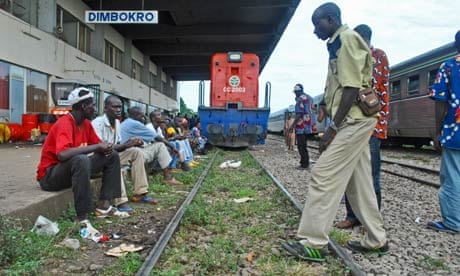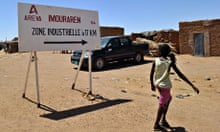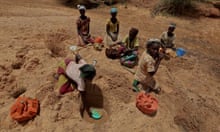A seven-year railway project to connect Niger and Ivory Coast is to begin next year as part of renewed efforts to improve rail infrastructure in the region.
The railway would link Niamey, the capital of landlocked Niger, with the Ivorian commercial hub of Abidjan, via the capital of Burkina Faso, Ouagadougou, after the extension of mining activities in west Africa.
The line would extend the existing railway that runs from Ouagadougou to Tambao, a lucrative manganese mine in the remote north east of Burkina Faso, near the border with Niger and Mali.
"This new railway will enhance trade between Côte d'Ivoire on the coast and Burkina Faso and Niger," said Bernard Abeiku Arthur, a transport expert working on a World Bank project to increase transport infrastructure in the region. "It is something that has been talked about by French engineering firms for years, to access the port of Abidjan, and link it with the raw materials that would be on that particular line."
The Niamey-Abidjan initiative is believed to be funded by the EU and French governments, with private investment from the Romanian industrialist Frank Timiş, whose company, Pan African Minerals, secured the rights to develop Tambao after a long history of legal squabbles between the government of Burkina Faso and several successive prospectors.
Timiş, known in Romania as the "emperor of west Africa", is expected to make billions from the exploitation of manganese at Tambao. The construction of the railway has been central to plans to exploit manganese at the mine since it was discovered in 1959. Tambao is expected to yield up to 1m tonnes a year.
Timiş is reported to be locked in a fierce rivalry with French billionaire Vincent Bolloré – whose eponymous congolomerate is investing in numerous infrastructure projects in west and central Africa, including a $100m high-speed rail project in Cameroon – for domination of African rail infrastructure, seen as key to controlling untapped mineral wealth. Neither Timiş nor Pan African Minerals were available to comment on the railway plans.
But the extension of the Ouagadougou-Tambao railway to Niger would represent a major infrastructure development in the country, which has no functioning railways.
"We desperately need railways," said Moussa Akfar, a Niamey resident. "Our roads are not practical. They are in such poor condition – it can take hours just to travel 100km. But these plans to create railway links with the ports in Cotonou and Abidjan are only concerned with transporting goods. They will not make it easier for people to move around."
A spokesperson from the Burkina Faso government confirmed that, up to now, the railway line has been used only for the transportation of manganese. "The railway has been running for some months, but so far it is only used for transporting manganese," said Zound Ali Zeta, from the Burkina Faso ministry of mines. "As to whether it will carry passengers in future, that is up to Pan African Minerals."
Many west Africans complain that new infrastructure projects do not help people. "Transport is supposed to be about the movement of people, goods and services, and the first of those is people," said Abeiku Arthur.
"The Niger-Abidjan railway is supposed to look at transporting goods in its first phase, with a later 'enhancement' integrating people into it. Infrastructure projects are very much influenced by colonial perspectives, and [are] much more interested in concentrating on raw material for export, rather than facilitating the movement of people."
There have been plans for pan-west African railway networks since countries in the region obtained independence in the 1950s and 60s, but none have come to fruition. The Niger-Ivory Coast extension is part of renewed efforts to improve rail infrastructure. Increased foreign investment and interest in natural resources have led to growing interest in such development.
Although the Niamey-Abidjan railway would link only Francophone countries, last week transport ministers from the Economic Community of West African States backed the construction of a 732-mile single railway line to connect Benin, Togo and Ivory Coast with Anglophone Ghana.
And earlier this month, Nigeria, also English-speaking, said it planned to develop a railway from the southern port of Warri to northern Nigeria, and Niger.
"To really enhance trade and competition in west Africa, there have to be linkages between multilingual countries, otherwise they risk enhancing the barrier between Francophone and Anglophone," said Abeiku Arthur. "There has always been talk of a west Africa rail masterplan, but so far this has always been just talk. There has to be a commitment from national governments if these plans are really to move forward."





